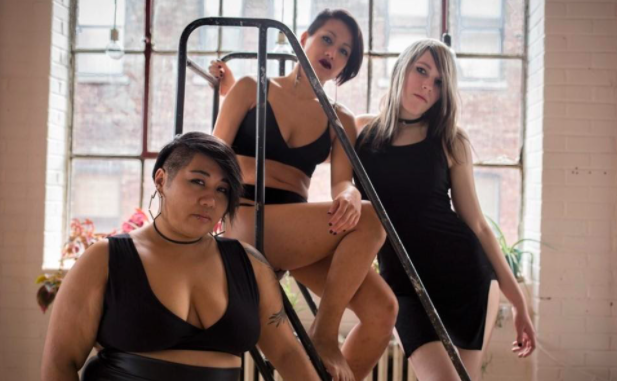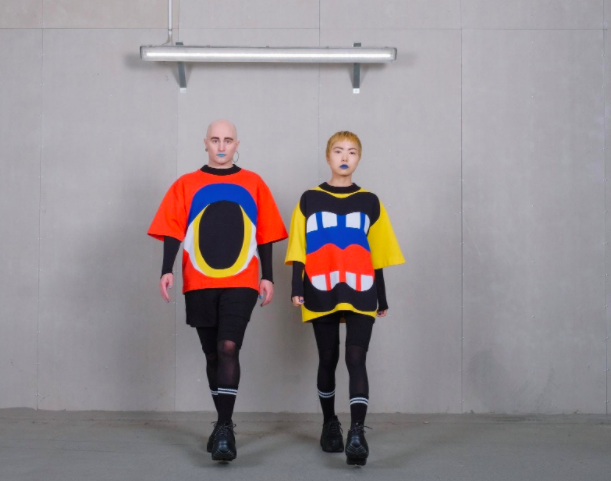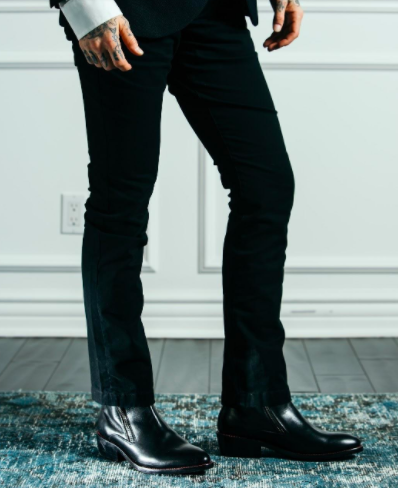Queer fashion experts aren’t new to the design world. They’ve graced the red carpet since it was first rolled out. But today’s recent crop of designers haven’t just roared their way onto the catwalk; they are making space for their designs by acknowledging equality and challenging gender norms. These niche designers entered the fashion world specifically to serve the LGBTQ+ community. Their designs have helped people express their gender identity across the globe and have proven that our fashion deserves to be mainstream.
Origami Customs
The undergarment industry has expanded and now features options for people of all genders. Rae Hill (they/them), founder of Origami Customs, designs gender-affirming products for folks of diverse genders. Their products consist of a wide array of undergarments that can be customized to meet any body type.
Origami Customs started 10 years ago in Honduras as a swimsuit line. But shortly after, Hill learned that the swimsuits weren’t fitting properly. “I identified that there were so many people in the water all the time who were really struggling to find swimwear that would last and that would fit them. And we were importing these name brand surf bikinis that just weren’t fitting people. I saw people getting very frustrated,” Hill said.
Now, their business has transitioned to fit the needs of their customers. Since the beginning of the coronavirus pandemic, Hill has seen an increase in gaff and binder sales. The undergarments are made from deadstock, local mills, recycled polyester, and regenerative bamboo. “I imagine people being in quarantine like this is a chance for me to live, and maybe if you’re working from home, wear things that you might not be able to if you were going out into public. People like experimenting with their gender expression,” they said.

Courtesy of Origami Customs/ Photographer Kinga Michalska
Ethical designs are important and crucial to Origami Customs because they value sustainability and do not want to increase materials that are already on the planet. “We’ve got some energy and we’ve got some room to grow, and so having those partnerships and being able to know that our products are going out to people that are facing access barriers was always like a super high priority for me,” they said.
Design and art are both a huge part of the fashion industry. Jannike Sommar (she/her) is an LGBTQ+ fashion designer who recently released her first capsule wardrobe. Her designs play with bold colors, designs, and abstract shapes. “I live in this LGBTQ+ universe, and I look into LGBTQ+ culture, and I’m collaborating with LGBTQ+ people like drag queens,” Sommar said.
Raised near Stockholm, Sommar took to using her imagination and creativity to express herself. “I am a thinking person and can easily dream away in my own world. Now, I create my own worlds with design,” she said.
Sommar, who studied fashion design in college, left her job at H&M to pursue designing full-time. Her capsule wardrobe has been years in the making. When she was in college, she experimented with textiles, patchwork, and embroideries. She also created a project surrounding lesbian culture which became the catalyst for her capsule. The school project featured LGBTQ+ culture and pop art. Her genderless designs capture an essential aspect of queerness: living a carefree life.
She has also collaborated with many LGBTQ+ creators, won the Belmodo Award Certificate of Amazingness, and in 2018, designed Swedish drag queen Admira Thunderpussy’s red carpet gown.
Now she lives in Paris with her partner working on her next capsule.

Courtesy of Jannike Sommar
NiK Kacy
Shoes are no longer binary thanks to NiK Kacy (they/them), shoe designer of Nik Kacy Footwear. They are also the Executive Producer of Equality Fashion Week. The transgender and nonbinary creator focuses on helping their community by advocating for LGBTQ+ rights and designing shoes for people with smaller feet.
Growing up, it was challenging for Kacy to find masculine shoes that fit their petite feet. They later found out this was a problem multiple people faced in the LGBTQ+ community. After quitting their job at Google, they decided to tour Europe to understand how shoes were made and how they could design shoes for people with smaller feet.
“I believe in working with people who have been doing this for decades — who are craftspeople, like who have mastered the art,” Kacy said.
But they encountered pushback from many of the shoemakers. Historically, shoes are made for men or women. Kacy wanted to create a gender-neutral shoe — something the shoe industry had never done nor was interested in at first. They encountered a lot of transphobia and homophobia, but they used this as an opportunity to be heard and stand firmly on their beliefs.
“This is my design; I’m your client. So even if you disagree with me, just make it and prove me wrong,” Kacy said. It took weeks, but they designed their first shoe.
All shoes are luxury, custom, ethically made, and gender-neutral.

Courtesy NiK Kacy Photographer: Rob Eves
“You can have the best outfit, but if you don’t have the right shoes with them, you don’t have an outfit. To me, shoes are what make a whole look and shouldn’t be treated like an accessory.”
Kacy also created Equality Fashion Week in Los Angeles as an opportunity to showcase LGBTQ+ designers and models in a safe space. But they believe that, eventually, there will be one fashion week celebrating everyone equally.
“The goal is that one day we don’t need to have equality fashion week, because everyone will be equal. That’s the goal: We will just have fashion week.”

What Do You Think?